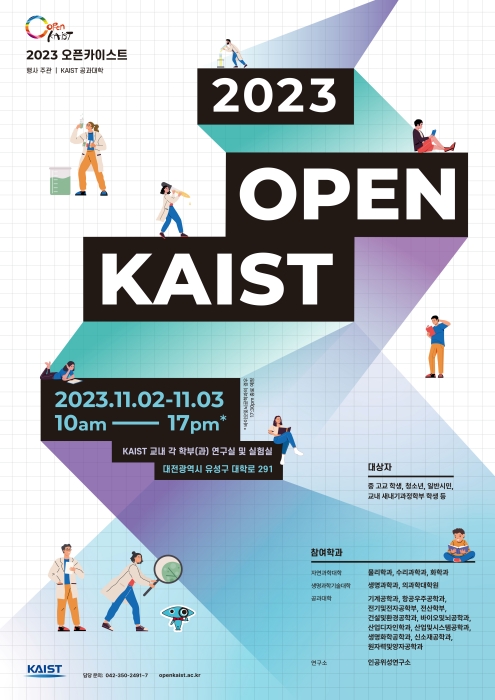KAIST held the OPEN KAIST 2023, a two-day event that showcased the inner workings of our university's research labs and centers, on November 2 and 3. OPEN KAIST, which began in 2001, is now in its 12th iteration and is organized by the College of Engineering, led by Dean Jaekyun Moon.

Held biennially, OPEN KAIST offers diverse programs designed to spark curiosity, answer questions, and inspire young minds that will shape the future of science and technology. This year, 16 departments and schools and the Satellite Technology Research Lab participated in the event, offering a total of 56 programs spanning four categories: Experiences and Demonstrations, Lab Introductions, Special Lectures, and Department Introductions.
One of the highlights of OPEN KAIST 2023 is the demonstration of various robotics technologies developed at KAIST. Professor Hyun Myung’s laboratory in the School of Electrical Engineering (EE) showcased DreamWaQer, a quadrupedal robot capable of autonomous walking. This robot made headlines by winning the international Quadruped Robot Autonomous Walking Contest in London earlier this year, surpassing universities like MIT and Carnegie Mellon University.
EE Professor David Hyunchul Shim's laboratory, which specializes in unmanned systems research, introduced Vanguard, a mobile robot capable of autonomous stair-climbing, breaking through the limitations of traditional four-wheeled robots.
In Professor Kyoungchul Kong's laboratory in the Department of Mechanical Engineering, visitors got an up-close look at various robots and their components, from mechanical elements and field joints to processors, simulations, drive motors, and fully assembled robots.
Professor Jee-Hwan Ryu’s laboratory in the Department of Civil and Environmental Engineering showcased a range of technologies suitable for disaster environments. These include haptic and remote control technologies for using robots in disaster scenarios, tree-like flexible robots for exploring disaster areas and distributing supplies, and autonomous/remote control driving technologies.
The event also featured programs to help attendees better understand the principles of science through hands-on experiences. Professor Dae-Young Lee's laboratory in the Department of Aerospace Engineering provided a session on aerospace robotics research, allowing visitors to create a transforming wheel structure using paper folding.
The Department of Nuclear and Quantum Engineering operated a hands-on program where visitors can observe and detect radiation using fog chambers and radiation detectors. This allowed the participants to witness the paths of invisible radiation through the fog and directly detect the levels of radiation in everyday items like vegetables and fruits.
Additionally, KAIST has organized lab tours that cater to the interests of middle and high school students, providing a simplified explanation of the lab’s research areas. The Optics Research Group of the Department of Physics prepared a program entitled "Fun Exploration with Light," making advanced optical science more accessible to all.
Professor Seongjin Ahn’s laboratory in the School of Computing presented essential elements and real implementations of Artificial General Intelligence (AGI) in a seminar. The seminar explained the abilities required for AGI, which humans possess but current AI models lack, by applying various example scenarios and facilitating a Q&A session.
The event also featured special lectures from KAIST professors, including topics like Misconceptions and Truths about Nuclear and Radiation, and Reversing Aged Cells to Youth and Health.
Dean Moon expressed his enthusiasm for the event, stating, "OPEN KAIST was created to offer an opportunity for visitors to experience and engage in challenging and creative scientific and technological innovations directly within KAIST's educational and research environment. We are delighted to welcome citizens to our school and research labs again after four years of conducting the event only online during the COVID-19 pandemic. We hope to see great interest and participation."

